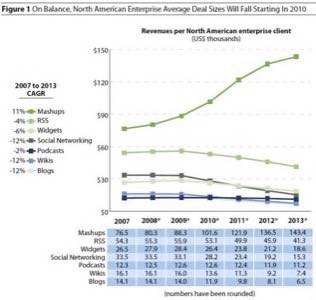A new report by Forrester Research states that the market for collaboration and productivity web apps in the enterprise (a.k.a. enterprise 2.0) is set for a shake-up, with prices to fall in some cases by over half. Price drops will be especially sharp in blog, wikis, social networking and widgets. The only exception is mashups, which will increase in price over the next 5 years.

Forrester says the price drops will be due to “cutthroat competition, commoditization, bundling, and subsumption”, with many startups and established big companies competing for the enterprise dollar.
There is still expected to be strong adoption by enterprises of web 2.0 apps, which will result in increased license revenue. However that will be offset by the large price drops.
Which Apps Will Suffer The Most?
The outlook is particularly bleak for blogging software, which Forrester says will “fall to the lowest average cost per enterprise among Web 2.0 tools” – that’s bad news for Six Apart and Automattic, both of whom have been aggressively targeting the enterprise in recent years.

Wikis are also expected to fall in price, however Forrester notes that wikis have had a strong impact on enterprises so far. So there will be more competition, but best-of-breed solutions will continue to do well. Forrester says that “well-designed, intuitive, and cheap wiki technology” will do best.
We’ve noted over the years that it’s very tough to create an easy-to-use and intuitive wiki app, therefore we expect existing best of breed providers such as Atlassian and SocialText to continue to do well. [disclosure: SocialText is a RWW sponsor]
Widgets are expected to drop in price a bit over the next 5 years, mostly because they will become far more common place than they are now. Forrester notes that traditional enterprise applications providers like SAP and Oracle will begin to offer widget solutions for their existing customers.
Social networking is expected to see a big drop, largely due to SharePoint. Forrester states that “much like blogs and wikis, social networking is likely to be commoditized
quickly over the next five years.” They do hold out some hope thought for “specialized tools that focus on alumni networks, new employee
orientation, and cross-department collaboration”, which they think may continue to get price premiums.
The one thing we’d caution here is that SharePoint so far has proven to be a complex and difficult to use beast, so we’re not so sure that easy-to-use alternatives will be commoditized by SharePoint. In theory it sounds sensible, but in practice how many people actually use SharePoint to network?
Forrester sees mashups as being very early in their market sycle, so it is optimistic pricing will increase. It states that “IT departments will prioritize mashup technology as part of portal, business intelligence, and business process management software investments as well as a major component of SOA implementations.”
Update: Jeffrey McManus (no relation) asked in the comments: “Who pays anything for mash-ups or widgets?” The report notes that both aren’t common – just 1.8% of North American enterprises had a widget deployment in 2008, while mashups so far have been “small isolated tests, typically limited to the IT department”. There are no figures given for how much widgets and mashups will grow, although Forrester says that it “never expects widgets to find a home in more that one-third of enterprises”. However there seems to be decent money in it for vendors, with an average of $26,500 per implementation for widgets in 2007 and $76,500 per deployment for mashups in the same period. Examples of current mashup platforms include JackBe, IBM, and Serena Software. Forrester expects the price for mashups to “nearly double to $143,400 per engagement by 2013.”
Also in the report, podcasts are predicted to remain largely unchanged over the next five years and enterprise RSS will play “a critical role as the Web 2.0 middleware, staving off major price declines.”
The graph below from Forrester summarizes all of the data:

Why Will Prices Drop?
One of the reasons is that old fear of web 2.0 companies: commoditization. As innovation gets copied and ‘digested’, so it becomes less of a differentiator for the innovators. As Forrester puts it in the report, “for the most part, a blog from one vendor is no better than a blog from another, eroding differentiation and price premiums.”
Bundling is another threat to startups, creating “a homogenous set of competitors.” Forrester seems to be suggesting that most enterprise 2.0 vendors are attempting to sell a Web Office suite: “Everyone, from blogging vendors like Six Apart to social bookmarking vendors like Connectbeam, is converging on one offering: the enterprise Web 2.0 suite.” This, says Forrester, will result in an “industrywide brawl, with buyers the only guaranteed winner”.
The third main factor is subsumption, which Forrester says “brings Web 2.0 technology to millions of users at little to no cost.” Subsumption in this case has a similar meaning to integration. It’s a tactic that the big vendors – like Microsoft, IBM, SAP and Oracle – have more easily at their disposal over startups. Forrester points out that these bigcos can easily roll Web 2.0 features into their existing software packages – in many cases at no extra cost to the user. Microsoft has been doing this with SharePoint, which has lightweight blogging and wiki tools bundled into the main product.
What’s more, Microsoft has managed to partner with a number of high profile but small enterprise 2.0 vendors – such as Atlassian and Newsgator. In June we profiled 9 small companies that had launched Enterprise 2.0 offerings that integrate with SharePoint technology. So this could be viewed as another form of ‘subsumption’, whereby startups have to partner with big companies like Microsoft in order to compete in this highly competitive market.
Even an apparently independent startup like Zoho, which seems to be competing well with bigger companies, has to a degree partnered with bigcos – their use of Google Gears has them relying on a technology produced by Google (ok, Gears is open source, but still it is a form of reliance).
Conclusion
Overall, the trend according to Forrester is that prices for enterprise 2.0 apps will fall but that demand will continue to ramp up. We at ReadWriteWeb can’t argue with the overall trend, however we think that startups still have a few tricks up their sleeves when competing against bulky and often hard to use products like SharePoint. However we’ve always said that partnerships – with bigcos and other startups alike – will be key to startups as they engage their bigger competitors in a crowded market.
Tell us what you think of these trends in the comments.
Image: pansonaut

















